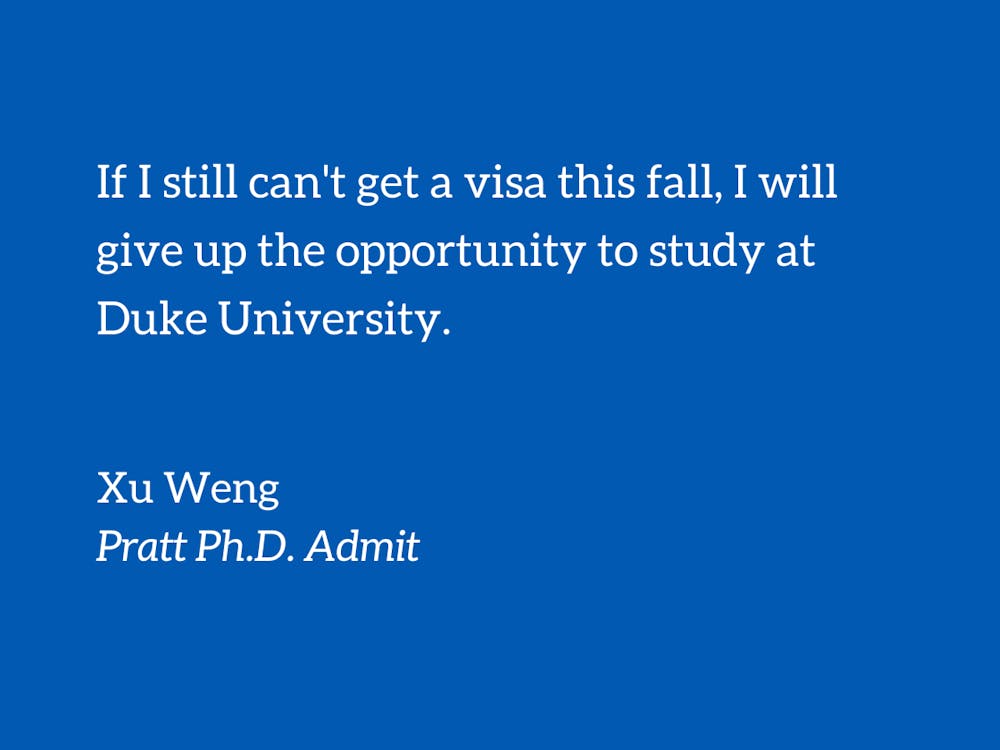One night two years ago, stuck at home due to Covid-19, I was tired of overcoming the anxiety of waiting for my Ph.D. application results and revising a paper over and over again. The sudden email from Duke University broke the restless night and told me I had been admitted to the Duke ECE Ph.D. program with a full scholarship. At that very instant, the long-lost happiness, excitement, and relief flooded into my heart. My parents were proud of me and shared the good news with others. For an ordinary Chinese family, it is not easy to train a student who can be admitted by a top university in the world.
Two months later, however, my American dream was brutally ripped up by the then U.S. President Donald Trump. On May 29th, 2020, he signed the presidential proclamation 10043 (P.P.10043) and claimed to prohibit students who graduated from universities supporting China’s ‘‘military-civil fusion strategy’’ from obtaining F visas or J visas. According to the New York Times, these schools include Beihang University, Beijing Institute of Technology, Beijing University of Posts and Telecommunications, Harbin Engineering University, Harbin Institute of Technology, Nanjing University of Aeronautics and Astronautics, Nanjing University of Science and Technology, and Northwestern Polytechnical University, which are top universities in China. I obtained my bachelor's and master's degree from two of these universities, one a member of China's elite C9 League, but my education was cut short: due to the proclamation, it is almost impossible for me to obtain a U.S. visa.
In China, people often compare a student trying to get into a good university to a carp attempting to swim upstream and then leap the falls of the Yellow River at Dragon Gate to be transformed into a dragon. At that moment, I was like a carp that had just jumped into the gate but was thrown out immediately. And the higher I jumped, the harder I fell.
My English was once poor, and I failed standard tests many times. But I never gave up. Every day, I insisted on getting up early to listen to English news and talking to native speakers via video chat apps. I also memorized a GRE vocabulary book more than 50 times. After trying 8 TOEFL tests and 5 GRE tests, I reaped satisfying results. My research skills, too, were not strong, so I spent days and nights in the laboratory reading literature, deriving formulas, conducting experiments, and writing papers. Finally, Duke University recognized my efforts, which convinced me that my dreams would eventually come true through my hard work, courage, creativity, and determination. Now, however, reality has taught me that a ban can contemptuously wipe out individual efforts.
I had to defer my enrollment to the next year without other options. During the gap year, I met many students who suffered from the same issue and joined a group of nearly 2,000 students to stop P.P.10043. We wrote joint letters to seek help from universities in the U.S. We luckily received a lot of positive responses. For example, the director of the international house at Duke university joined us and listened to our specific appeals. Chris Simmons, Associate Vice President, Duke Government Relations, also arranged a particular conversation with us to respond to our requests. However, all of these efforts could not shake off the ban.
Another year passed, and I still could not obtain a visa. Fortunately, Duke University offered me another chance to defer admission to the college. I tried to apply for a U.S. visa in Singapore this winter. Surprisingly, after a month of administrative processing, I got it! I immediately shared this good news with my supervisor and everyone at the Duke visa services office, who were always helping me. After two months, however, when I had just started to make my travel plan to the U.S., the embassy called me to say that they had to cancel my visa because of P.P.10043. Once again, I felt like I was being thrown down from a height. A deep sense of despair overwhelmed me.
We have no choice but to make a lawsuit plan against this unfair ban. However, it is not easy for us Chinese students to file a lawsuit against the U.S. government. It took us about half a year to raise $150000 for our lawsuit and another half a year to find suitable lawyers and professors as the plaintiff. Finally, we filed the first case in Illinois on June 27th, 2022. The short goals of our lawsuit include having temporary restraining orders (TRO) to obtain an injunction of P.P.10043 at the primary stage in the future 2-4 weeks and having a Preliminary Injunction (P.I.) of P.P.10043 in the future in 6-12 months. The ultimate goal of our lawsuit plan is to repeal P.P.10043 permanently.
I think this is my last attempt. If I still can't get a visa this fall, I will give up the opportunity to study at Duke University. My heart hurts, but my life must move on. Maybe this is life.
If you can see this article, please share it with the Blue Devils around, students and teachers from other universities, and let more people know about us, a group of students shielding their dreams against an unfair ban. Let's #STOP 10043!
Xu Weng is a Pratt ECE Ph.D. admit affected by P.P. 10043.
Get The Chronicle straight to your inbox
Signup for our weekly newsletter. Cancel at any time.

